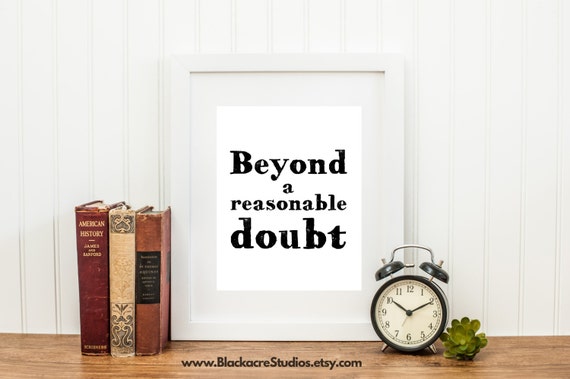

At Guantánamo, a “preponderance of the evidence,” the standard applied in deciding civil disputes over money, is enough to detain a person indefinitely without trial. Tens of thousands of people have found themselves arbitrarily consigned to the American No Fly List without due process or a meaningful right to appeal. Yet today, in a whole range of cases related to the so-called “War on Terror,” guilt is pronounced on the most meager of circumstantial grounds.


As such, it is a jurisprudential ideal: the highest standard of justice to which a society can strive. In American courts, juries are asked to convict or acquit on the basis of “reasonable doubt,” since proving a defendant’s guilt beyond the shadow of a doubt is all but impossible. The phrase refers to an unattainable burden of proof. Judge Welch also agreed that Gutierrez acted unreasonably by failing to contact potential alibi Asia McClain, but said this wasn’t the reason he vacated the conviction, writing that Syed did not prove that calling McClain to the stand would have created a reasonable probability of a different verdict.Today, on Veterans Day, on the 11th day of the 11th month, an aircraft began circling the Statue of Liberty trailing a banner that read “THE SHADOW OF A DOUBT.” The short story is this: Welch found that Syed’s trial attorney, the late Cristina Gutierrez, didn’t challenge the reliability of some potentially faulty cell-phone tower evidence – what the judge called the “foundation” of the state’s case – a mistake so egregious that it violated Syed’s right to effective counsel. Judge Welch’s 59-page opinion breaks down his decisions on the issues raised by Syed’s defense attorneys, Justin Brown and Chris Nieto, in their appeal. Welch, who presided over Syed’s post-conviction relief hearing in February, vacated his conviction and granted him a new trial. Yesterday, Adnan Syed, whose conviction and life sentence for the murder of his high-school girlfriend was the focus of the first season of the hit podcast Serial, got the news he had been waiting to hear for over 16 years – Baltimore Circuit Court Judge Martin P.


 0 kommentar(er)
0 kommentar(er)
